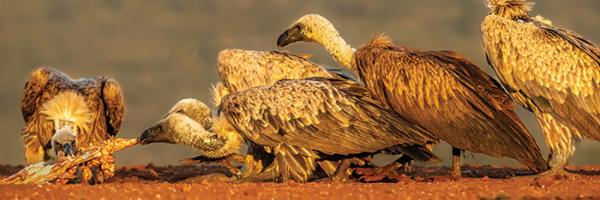Dany Chan
In a letter published today in the journal Science vulture researchers have raised the alarm concerning the relentless poisoning of critically endangered vultures across Africa. During the past 20 months over 1000 vultures have perished due to widespread poisoning on the African continent. Vulture poisonings have occurred in Mozambique, South Africa, Botswana, Zambia, Namibia, Tanzania, and Kenya.
Two of the most substantial poisoning threats come from poachers and traditional healers. Poachers deliberately poison vultures in an effort to eliminate them because by flying over carcasses vultures reveal the poachers’ presence. Vulture body parts are harvested unsustainably for medicinal and other belief-based uses and this is typically carried out using poisons.
Lead author Dr. Antoni Margalida said, “The sustainability of free-ranging vulture populations depends on our ability to identify and mitigate existing and future threats. In this sense, African governments should prioritize the reduction of illegal poisoning related to belief-use and poaching, as well as the education of their citizens about the dangers of pesticide misuse.”
Vultures are vital for healthy ecosystems and their role in rapidly consuming carcasses is both an undervalued ecosystem service as well as an iconic phenomenon of the African savanna.
The authors urge African governments to prioritize the reduction of illegal poisoning related to belief-use and poaching. The education of citizens concerning the dangers of misusing pesticides should also be a top priority.
Dr. Darcy Ogada of The Peregrine Fund, and an author, stated, “Its time that African governments acknowledge and address the massive problem of pesticide misuse. As poisoning continues to devastate vulture populations, the widespread misuse of pesticides seriously threatens the health of Africans, their livestock as well as the environment that we all share”.
“Although some actions recommended by the Vulture MsAP to reduce the impact of poisoning on the continent’s vultures have been implemented in some areas in southern, east, and west Africa, a lot more needs to be done. For example, better coordination of such activities in identified poisoning hotspots and cooperation between multiple stakeholders is needed” concludes Andre Botha from the Endangered Wildlife Trust in South Africa.
The article can be found here: https://science.sciencemag.org/cgi/doi/10.1126/science.aay7945
Contact the authors:
Dr. Antoni Margalida
Institute for Game and Wildlife Research, IREC (CSIC-UCLM-JCCM), Ciudad Real, Spain
Dr. Darcy Ogada
Assistant Director of Africa Programs, The Peregrine Fund, Nairobi, Kenya +254-722-339366
Mr. Andre Botha
Manager – Vultures for Africa Programme, Endangered Wildlife Trust, Johannesburg, South Africa
Co-chair – IUCN SSC Vulture Specialist Group






